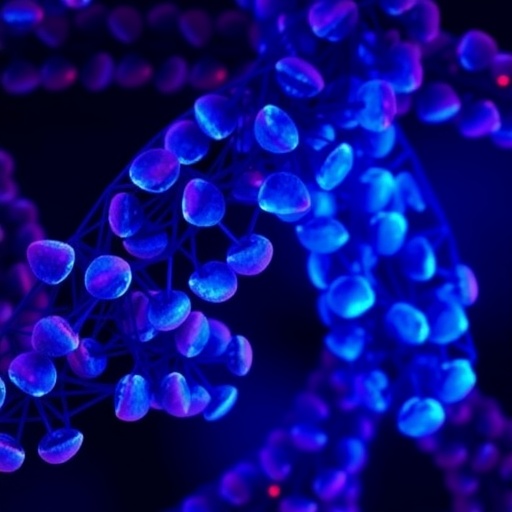Non-small cell lung cancer (NSCLC) remains one of the most challenging cancers to treat effectively, with a significant need for ongoing research into innovative therapeutic approaches. A groundbreaking study led by researchers Hu, Yan, and Tian, along with their team, delves into the role of neutrophils in the progression of NSCLC and their potential implications for immunotherapy with PD-1/PD-L1 inhibitors. This meticulous investigation, recently published in the journal Journal of Translational Medicine, sheds light on several pivotal aspects of tumor microenvironments and their influence on cancer treatment efficacy.
Neutrophils, a type of white blood cell, are traditionally known for their role in the innate immune response against pathogens. However, recent findings suggest that their presence within the tumor microenvironment can either hinder or facilitate tumor growth and immune evasion. In the context of NSCLC, these versatile immune cells exhibit dualistic behavior; they can promote inflammatory responses but may also contribute to tumor progression under certain conditions. This complexity necessitates a more profound understanding of their mechanisms and interactions with cancer cells, which this study aims to provide.
The investigation emphasizes that neutrophils, often present in large numbers in the blood of lung cancer patients, are not passive observers but active participants in tumor biology. The study outlines how cancerous tissues may manipulate neutrophil functions, leveraging these immune cells in ways that promote tumor survival and growth. By altering their activation states and secretory profiles, tumors can effectively utilize neutrophils to create a microenvironment conducive to cancer progression.
One critical aspect the researchers explored is the interaction between neutrophils and the PD-1/PD-L1 axis, a vital immune checkpoint pathway that tumors exploit to evade immune detection. The findings indicate that neutrophils can express PD-L1 themselves, thereby participating in the immune suppression experienced by patients undergoing immunotherapy. This revelation prompts essential questions regarding the effectiveness of PD-1/PD-L1 inhibitors in patients with high neutrophil infiltrates. The authors argue that the interplay between neutrophils and this immune checkpoint pathway could provide insights into why some patients respond poorly to these therapies.
Moreover, the study highlights the potential for a synergistic effect when combining neutrophil-targeting strategies with PD-1/PD-L1 inhibition. By reprogramming neutrophils to perform their traditional role as defenders against cancer rather than aiding its progression, it may be possible to enhance the efficacy of existing immunotherapeutic approaches. This dual-targeting strategy represents a promising frontier in the ongoing battle against NSCLC.
The implications of this research extend beyond basic science, touching upon the practicalities of treatment. As clinicians strive to personalize therapies for NSCLC patients, understanding the nuances of neutrophil behavior could inform biomarker development, paving the way for tailored immunotherapeutic strategies. The authors advocate for clinical trials designed to assess neutrophil dynamics in concert with PD-1/PD-L1 therapy, urging a shift towards a more comprehensive view of tumor immunology.
In conclusion, the study’s findings sharpen our understanding of neutrophils within the context of NSCLC and immunotherapy. By unraveling the complexities of immune cell interactions within tumors, this research propels the field towards new therapeutic paradigms. As scientists continue to explore the intricate web of cellular interactions within the tumor microenvironment, the hope for improved outcomes in lung cancer treatment becomes increasingly attainable.
These revelations are expected to prompt significant shifts in how oncologists approach the treatment of NSCLC, encouraging the development of novel combination therapies and informing future research directions. The need for robust clinical validation remains paramount, as the accurate manipulation of immune cells could turn the tide in the fight against one of the leading causes of cancer mortality worldwide.
This study exemplifies the importance of interdisciplinary research in oncology, where insights from immunology unlock potential breakthroughs in cancer treatment. As research continues to evolve, the integration of data from various biological realms could culminate in the next generation of immunotherapies, dramatically changing the landscape of cancer care.
With continuous advancements in our understanding of immune system dynamics, the quest to outsmart cancer persists. The exploration of neutrophils’ role in NSCLC and strategies to harness their power marks a pivotal point in this relentless pursuit, reaffirming the critical need for further inquiry and innovation.
The publication of this study serves as both a catalyst for discussion and a wellspring of inspiration for future research endeavors. As the landscape of immunotherapy expands, the lessons learned from this research will guide the way toward more effective, personalized cancer treatments with the potential to save lives.
In summary, Hu, Yan, Tian, and their team’s work represents a significant contribution to the understanding of neutrophils in NSCLC and the potential for improving immunotherapy outcomes through strategic targeting of immune pathways. This research sets the stage for a new era in cancer treatment, where the intricate dance between tumors and the immune system will be choreographed for a more favorable outcome for patients.
Subject of Research: The role of neutrophils in non-small cell lung cancer and the implications for immunotherapy targeting PD-1/PD-L1 inhibitors.
Article Title: Neutrophils in non-small cell lung cancer and immunotherapy with PD-1/PD-L1 inhibitors.
Article References:
Hu, S., Yan, C., Tian, Y. et al. Neutrophils in non-small cell lung cancer and immunotherapy with PD-1/PD-L1 inhibitors. J Transl Med 23, 1313 (2025). https://doi.org/10.1186/s12967-025-07084-z
Image Credits: AI Generated
DOI: https://doi.org/10.1186/s12967-025-07084-z
Keywords: Non-small cell lung cancer, immunotherapy, neutrophils, PD-1, PD-L1, tumor microenvironment, immune checkpoint inhibitors.




